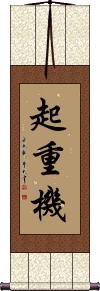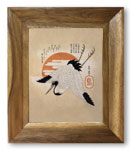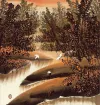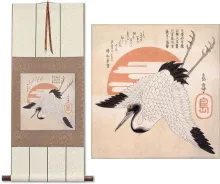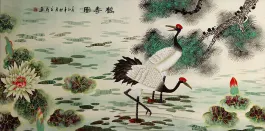Many custom options...
And formats...

Construction Crane in Chinese / Japanese...
Buy a Construction Crane calligraphy wall scroll here!
Construction Crane
起重機 refers to the huge machine that lifts materials high into the air as crews construct huge buildings.
A customer requested this specifically after some confusion over the bird by the same name.
In an odd twist, while they don't know this name in English sounds like a bird; the building crane is jokingly called “The real national bird of China” because of the accelerated level of construction in Beijing and elsewhere ever since preparations began for the 2008 Olympics. As of 2018, construction has barely slowed.
If you want the type of construction crane that drives down the road, please note that the word is totally different for that kind of “vehicle crane.”
This in-stock artwork might be what you are looking for, and ships right away...
Gallery Price: $120.00
Your Price: $79.88
Gallery Price: $120.00
Your Price: $79.88
Gallery Price: $96.00
Your Price: $52.88
Gallery Price: $120.00
Your Price: $79.88
Gallery Price: $96.00
Your Price: $52.88
Gallery Price: $340.00
Your Price: $188.88
Gallery Price: $52.00
Your Price: $28.88
Gallery Price: $220.00
Your Price: $138.88
Gallery Price: $120.00
Your Price: $79.88
Gallery Price: $120.00
Your Price: $49.88
The following table may be helpful for those studying Chinese or Japanese...
| Title | Characters | Romaji (Romanized Japanese) | Various forms of Romanized Chinese | |
| Construction Crane | 起重機 起重机 | kijuuki / kijuki | qǐ zhòng jī qi3 zhong4 ji1 qi zhong ji qizhongji | ch`i chung chi chichungchi chi chung chi |
| In some entries above you will see that characters have different versions above and below a line. In these cases, the characters above the line are Traditional Chinese, while the ones below are Simplified Chinese. | ||||
Successful Chinese Character and Japanese Kanji calligraphy searches within the last few hours...
